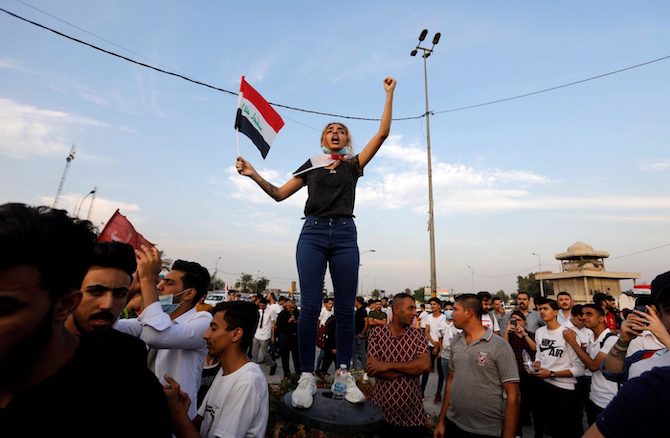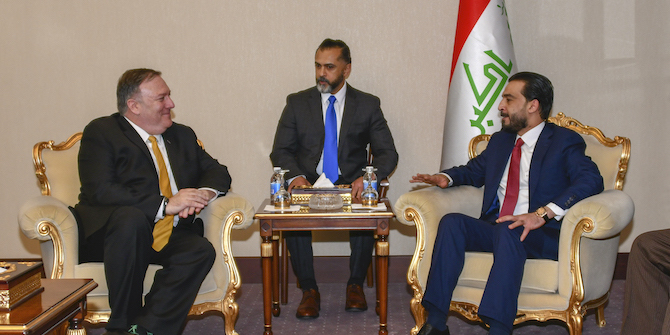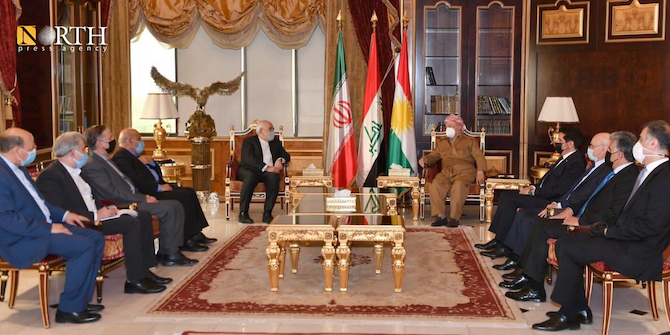by Sajad Jiyad

While it is well known that Iraq is entrenched in corruption and that the political elite are the key enablers of it, the exact mechanisms of how corruption operates is not well understood. A peculiar social phenomenon of Iraq is that public debate on corruption is constant, and politicians engage widely on the topic but published research is limited. Iraq’s libel laws and other legislation that challenge freedom of speech add to the real dangers of powerful political groups and their armed wings silencing critics through violence and intimidation. Despite the competing political interests, the elevation of the economic interest above all else has led to a cooperative power-sharing arrangement dominating post-2005 Iraq. This article previews a forthcoming report that will investigate the mechanisms by which the political elite in Iraq conduct corruption, mostly of the extractive type, and allows them to maintain a decentralised grip on power.
The most important element that allows corruption to operate systemically in Iraq is the political elite’s control of the state through all its institutions and at all levels. Regime change in 2003 led to various parties taking over the state progressively and eventually led to the power-sharing system known as muhasasa, which is a method of apportionment of positions in the state based on the size of each party’s power and influence, usually measured through their seats in parliament. The parties apply the muhasasa to every possible institution in the state, meaning the networks of the political elite spread through the state like a mesh. The parties then cooperate to facilitate corruption and protect it, meaning those who are non-aligned in the system or not part of corruption are much less influential or powerful. This muhasasa applies to junior positions and departments all the way up to the cabinet, and to the security forces, independent commissions, judiciary, and so on. The state’s capture by the political elite using muhasasa allows them to perpetuate their power, be in a position to engage in corruption without obstruction, and prevent accountability.
Because the corruption in Iraq is systemic there are many types of corruption schemes in operation. The first type involves public procurement and contracting, where graft and kickbacks (diverting contracts to maximise private or political interests), inflation of costs, fraud (false billing), nepotism and clientelism, extortion, and blackmail are used widely to ensure public funds are captured or extracted to the benefit of the political elite. The second type is theft of public funds using embezzlement (such as the ‘Heist of the century’). The third is patronage (to ensure voters, loyalists and members are rewarded by pushing them into the public sector), payroll fraud (through abseentism or ghost employees) and salary skimming. The fourth is smuggling of oil and derivatives, contraband and fake goods. The fifth is facilitating the narcotics trade and other similar trades. The sixth is bribery, extortion, blackmail for political or purely financial purposes. In the middle of all of this is a key relationship that is not well known, that between the political elite and the businessmen who benefit from these schemes. It is a kind of political-corporate complex in which politicians do not engage directly in corruption but work with businessmen who may have no political loyalties but are willing to facilitate corruption and launder proceeds from it in return for a cut. In some cases, it is the businessmen themselves who are the masterminds of the corruption schemes and approach politicians to help them in exchange for financial or other rewards. Some of these relationships and networks overlap and party lines are blurred.
The proceeds of corruption are then invested in building up commercial empires through properties, media networks, retail and corporate businesses inside Iraq or moved to other countries for similar investments. Armed with this wealth the political elite are able to further enrich themselves and to become less dependent on extracting public funds. The same political networks that control the parliament, government and the public sector are also able to compromise accountability mechanisms so that they escape justice. This is achieved through influencing appointments so loyalists are placed in key positions through several institutions (such as the judiciary and Integrity Commission), extortion and blackmail to ensure investigations do not succeed, removing people who pose a threat (for example a judge in a corruption case in Baghdad moved to a border town to deal with civil and family cases), and using bureaucratic procedures to obstruct accountability (such as not exercising arrest warrants or government departments not providing evidence or cooperating with investigations). Violence is a readily available tool that the political elite resort to, especially as most of the established parties have armed wings, which makes standing up to corruption a dangerous undertaking.
In order to effectively challenge corruption, reformists need to devise a wide-ranging strategy and utilise as many resources as possible. This is because the powers behind corruption are determined, well-resourced and have a clear strategy of preventing accountability. If the aim is to force the political elite to change their behaviour and hold them to account, pressure must be applied in every conceivable manner. Public opinion is an obvious starting point and influencing that by uncovering how corruption is carried out through investigative journalism, supporting the work of transparency activists and organisations, promoting whistleblowing, and changing the culture of accepting corruption as a necessary evil through educational, awareness and training programs can all contribute to this. Other elements of such a strategy need to include legislative measures, lobbying international organisations and foreign countries to demand Iraq undertake transparency measures and show greater accountability, and pushing the government for a reduction in paper-based convoluted bureaucracy that opens the way for corruption. Iraq has the potential to be better but so far the political elite are relaxed enough that they do not feel the need to undertake reforms.
[To read more on this and everything Middle East, the LSE Middle East Centre Library is now open for browsing and borrowing for LSE students and staff. For more information, please visit the MEC Library page.]







Great article, it should be published in other languages especially in Arabic and Kurdish to raise awareness as to how to fight back against systematic corruption in the government and business. Yes, the response should be multi faceted, and I would ad that Iraqis should recruit international help as they can not do it alone, as well as there should be an international court to look into and possibly try high profile “thieves”. Also this should be viewed as a crime against humanity because they impovrish millions of Iraqis of all ethnic backgrounds, destroy children’s health and educational systems in a country of over 30 million people.